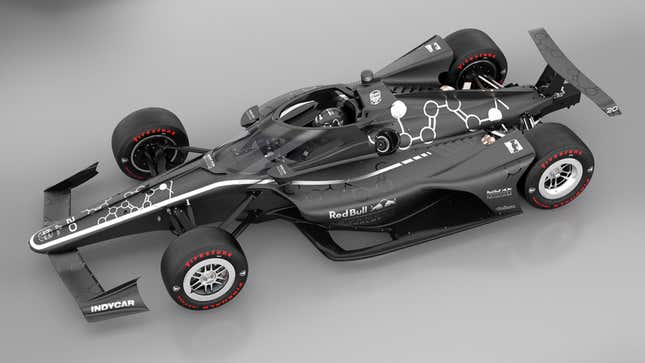
Moves to at least partially close the cockpit in series like IndyCar and Formula One are long overdue, given the injuries and fatalities associated with leaving drivers’ heads wide open. But F1 finally mandated head protection with a “halo” in 2018, and IndyCar will be next—with a device called the “aeroscreen.”
The plan is for the aeroscreen to come to IndyCar in 2020, the series announced Friday, to “reduce the risk of driver injury from debris or other objects striking the cockpit area.” Between now and then, the Red Bull Advanced Technologies-developed screen will be tested, refined and eventually delivered to teams.
The device might look familiar, too, because a Red Bull aeroscreen concept was also tested by F1 before the series went with the less elegant-looking halo. Here are the details on the version that will come to IndyCar, via the announcement:
The Red Bull Advanced Technologies design will consist of a polycarbonate laminated screen that includes an anti-reflective coating on the interior of the screen, an anti-fogging device through an integral heating element and possibly tear-offs, all of which will be produced by integrated third-party companies. [...]
The load bearing is expected to be 150 kilonewtons (kN), which would equal the FIA load for the Halo design currently used in Formula One. A kilonewton is equal to approximately 225 pounds, which is a force of gravity rating, not static weight or mass. Force is equal to mass multiplied by acceleration.
It’s worth noting that IndyCar claims its aeroscreen will have the same load-bearing capabilities as the halo, which we’ve already seen save a few drivers’ heads. The plan, IndyCar said, is for teams to have their screens by fall.
The aeroscreen is the second part of IndyCar’s attempt to deflect danger from the cockpit, the series announcement said, coming after the “Advanced Frontal Protection” device it’s already put in place. The device is meant to help deflect debris from the cockpit area, and will be in use for the rest of the season.
But 2020 will be when the real move to partially close the cockpit will come, if it sticks schedule. And, while it’s long overdue, it’s kind of like a (potentially life-saving) visit from your fun aunt—you can’t be too mad when it finally arrives.